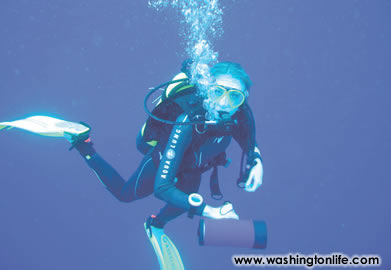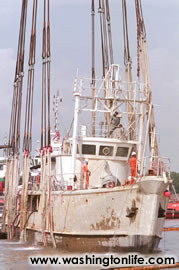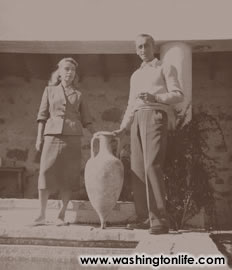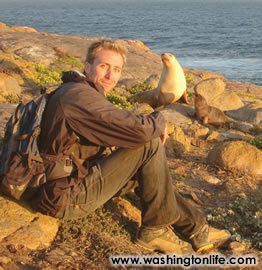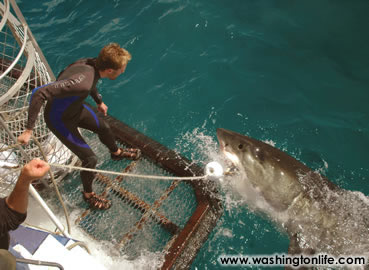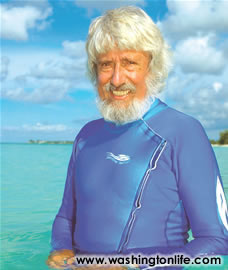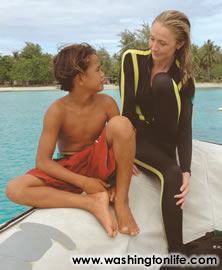Swimming With SharksPhilippe and Alexandra Cousteau captain their grandfather's legacy to calmer shores BY ROLAND FLAMINI
Jacques Cousteau brought oceanography to millions whose only prior acquaintance with the sea world had been seeing its inhabitants grilled on a plate. With his distinctive beak nose and spindly legs he looked like some rare species of bird -and in a way, he was: a genuine television personality who could keep people from switching channels, whether he was dancing with dolphins or explaining the importance of respecting the ecology. In 1956, Cousteau earned the first of his three Oscars with the film The Silent World. But since his death a decade ago at 87, the world of his surviving family has been anything but silent, and the lawsuits are still flying both in France and in the United States. Nothing symbolizes the controversy surrounding the Cousteau legacy and what it stands for more than the plight of his beloved Calypso, the flagship that for nearly half a century sailed the oceans with the French undersea adventurer.
Stripped of the hi-tech exploratory equipment that he installed, the ship is literally rotting in the French Atlantic coast harbor of La Rochelle while rival groups quibble over ownership. But the picture is not all grim. One bright spot is the work of Cousteau's two young and dedicated grandchildren, Alexandra Cousteau, 30, and Philippe Cousteau, 27, who are making their own mark in oceanography films and television programs. But more on the Cousteau siblings later. Keeping the characters straight in this tangled dispute requires a chart. The legal fight over Calypso involves Cousteau's second wife Francine Cousteau (née Triplet), the long-time mistress he married in 1990 after the death of his first wife Simone. Francine, who was more than three decades younger than the Cousteau, inherited the rights to hundreds of Cousteau films and images and control over the Cousteau Society. She had a somewhat rude awakening when she discovered that the estate did not include Calypso, because Jacques Cousteau had never owned it.
It turned out that some 50 years earlier, the Calypso was bought by Loel Guinness, scion of the Irish brewing family, and leased to Cousteau for the nominal sum of one franc. But in the early 2000s, after nine months of negotiation, the Guinness company reached an (undisclosed) agreement shifting ownership to Francine and the Cousteau Society's French branch, the Equipe Cousteau. When her ownership was challenged by the Campagne Oceanographiques Francaises (COF), which is headed by Jean-Michel Cousteau, the commander's son by his first marriage, the case went from the local court in La Rochelle all the way to the Paris Appeals Court, which in March 2006 found in favor of Francine. Owning the Calypso, however, doesn't resolve the problem of what to do with it. Plans to turn the ship into an oceanographic museum in La Rochelle were abandoned for financial reasons. Last year, Francine was quoted as saying that she planned to have the Calypso turned into a scientific education center in the Bahamas. The COF wants to block this and keep the ship in France. "This is a historic vessel that should have been classified as part of the French national heritage a long time ago," Jean-Michel Cousteau was recently quoted as saying in the Cyber Diver News Network website. The claim is about as sea-worthy as the Calypso itself in its present state of dilapidation. Cousteau's famous research vessel was built in the United States as a minesweeper for Britain's Royal Navy in World War II. When Guinness acquired it, the Calypso was a ferry in Malta-then a British colony-linking the Mediterranean island to its smaller sister island, Gozo. Cousteau, whose French accent sometimes came close to being a parody, only became a French icon after his huge success in the United States. Says Alexandra: "It was really the United States that launched his career." The question is whether the Calypso is still capable of filling any role assigned to it. Languishing lifelessly beside an out-of-the way quay in the historic port, its rusting hulk recently covered in protective plastic, it would require major renovation work. "We had an expert's report done recently and they said it was no longer a question of repairing the boat, but of rebuilding it" a maritime official in La Rochelle said recently. Whether Francine has the financial resources for such a major undertaking is not clear. The 44-year-old Cousteau Society started by Jacques once had 250,000 members in the United States alone. But with his death its membership has declined to 150,000 and its donations have shrunk considerably. The growing view in La Rochelle is that the Calypso should be towed out to sea and consigned to a watery grave where scuba divers can use it for practice, before it sinks in the harbor itself.
On the other side of the Atlantic, the explorer's enthusiasm and vision live on in Alexandra and Philippe Cousteau. The children of Jacques Cousteau's second son Philippe, who died in a plane crash in 1979, they carry on the work of education and conservation through their own EarthEcho Foundation. In April, locally based Philippe will be filming sea lions and elephant seals off the coast of Monterey, Calif., for the U.S. cable network Animal Planet, a part of the Discovery Channel. Alexandra is an activist with the European Shark Alliance, a non-profit organization dedicated to restoring and conserving the shark population. Her recent television credits include a documentary filmed in French Polynesia for a French cable channel. "We both felt there was a niche and a need for a reassessment of priorities in conservation from raising awareness to inspiring behavior change -and that's what we're about," Philippe Cousteau Jr. said recently. He calls it "moving forward" his grandfather's legacy on the ecology and conservation. Philippe is chief ocean correspondent for Animal Planet, and is co-host of a series called Oceans Five for the BBC and the Discovery Channel. EarthEcho was the subject of another Cousteau legal battle. When Alexandra and Philippe Jr., and their widowed mother Jan, launched their oceanographic company seven years ago they named it the Philippe Cousteau Foundation, after the father Phillipe had never known. Philippe Sr. was killed before his own son and namesake was born. A legal suit by the Cousteau Society forced a name change. The Society claimed the Cousteau Foundation was causing confusion by using the Cousteau name. "We decided to settle because we realized that Philippe Cousteau Foundation was too lengthy and hard to spell - and we didn't want to get swallowed up by a lengthy legal battle," says Philippe. "Not to mention that we couldn't afford it."
Philippe Cousteau shrugs off the family battles, especially the ones in distant France. He does, however, say that he has no contact with Francine Cousteau. "We have no desire to live off the Cousteau name," he says. "Having a legendary grandfather has its uses for gaining access, but the doors are quick to shut if you don't deliver." Besides, the environment has changed. "We were pretty young during my grandfather's heyday," he says. "There's a new generation to win over that has never heard of Jacques Cousteau, there are new ways to carry the movement forward."
He argues that environmental action is something for all segments of society, not just scientists. "Any expertise can be applied to environmental action," Alexandra was quoted as saying. "People often think our grandfather was an oceanographer. He wasn't. My father wasn't. They were cinematographers. They were great communicators, writers and poets. They were brilliant, but neither of them had a degree in oceanography." In the present atmosphere a pooling of family resources to resume Jacques Cousteau's work on the ambitious scale of the famous ABC television series The Undersea World of Jacques Cousteau would be out of the question. But while Cousteau himself was breaking new ground with underwater images of sea life in color, the world has moved on. As Philippe says, in an age of digital imaging, video games and cable tv, there are new oceans to conquer.
| ||||||||||||||||||||||

